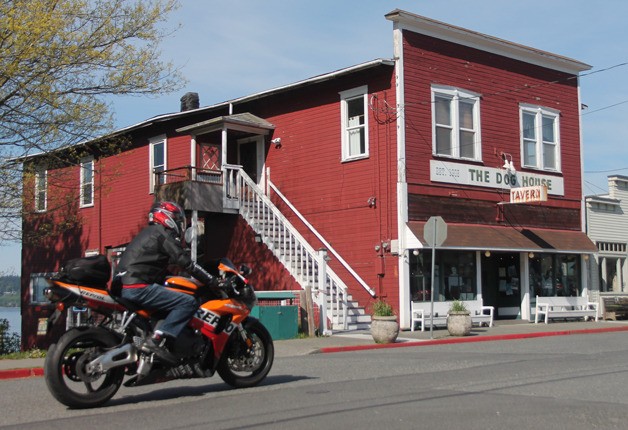The owner of the Dog House Tavern, an iconic century-old building in downtown Langley, plans to tear the historic structure down.
As of Friday, a commercial demolition permit application had not been filed at City Hall, but Charlie Kleiner, who with his wife bought the building at a 2010 auction, confirmed in a Thursday interview with The Record plans to destroy the building. Kleiner said they bought the Dog House with plans to restore it, but now feel demolition is the only viable option.
“When we bought the building … it was kind of an albatross,” Kleiner said. “But my wife liked it.”
“We thought, if things go our way, we’ll keep the building … It didn’t work out, so down she comes,” he added.
The Dog House was the site of the first movie shown in Langley, housed several stores and high school graduations, and is listed on the National Register of Historic Places under its original name The Olympic Club.
News of possibly losing the historic building was not welcomed by Bob Waterman, president of the South Whidbey Historical Society and chairman of the Langley Historic Preservation Commission.
“It is sort of the icon of the city in terms of the publicity for the city,” Waterman said. “It anchors that corner of the downtown where the town actually began at the intersection of Anthes [Avenue] and First Street … It is a symbol of Langley that would be a terrible shame if it was no longer there.”
Kleiner blamed rising costs to renovate the historic building and difficulty working with the City of Langley concerning easement issues, as the basis for the decision to pursue demolition rather than restoration.
He said he had the full support of former mayor Larry Kwarsick, and later felt backed by Mayor Fred McCarthy, but that the relationship with the city has since soured. Langley officials sought a land swap that would give the city the existing property’s northern-most area — also the closest to the waterfront — in exchange for public property under the deck and by the stairs. The Kleiners withdrew their land request because they felt it was an unfair swap. Without that piece of property, Charlie Kleiner said his plans to renovate the building were stalled.
“I can’t do anything with the building without the other spot that we asked for,” he said. “I’ve moved on.”
“The city just asked for too much,” he added. 
Langley Director of Community Planning Jeff Arango disagrees. He said the city’s request was reasonable given that the Kleiners insisted on owning the piece of city property.
“From the city’s perspective, if the Kleiners felt they absolutely had to have the portion under the porch and stairs, it was a way to move on without legal challenges,” Arango said, adding that another option was for the building to continue using the easement with city permission — but also with the remote possibility the city could revoke that use at any time.
“Unfortunately the Kleiners felt otherwise,” Arango said.
Waterman, Langley’s resident historian, said his main concern was trying to keep its historic First Street and Hladky Park facades. As a member of the historical society, he tried to have the Kleiners add the building to the city’s register, which would have included a 10 percent reduction in property taxes but would also have added a significant step in demolition of the building by requiring the local register chapter’s approval.
Even with his ties to the building and its history, like the story of a woman who gave birth on a pool table in the formerly-named Howard’s Confectionery, Waterman understood that renovation would cost more than new construction, despite tax credits and possible grants.
“Many old buildings, it’s better to repurpose them,” Waterman said. “This Dog House would need a lot of restoration, a lot of shoring up just to make it safe.”
Kleiner, however, seemed resolute in his plan to be done with the Dog House Tavern and instead build something new. He couldn’t say for sure what will be built in its place but did say it would not look “anything like the current structure” and that any future structure would bring a financial return, such as a condominium or a commercial space for a business.
“The least expensive way out is a new building,” Kleiner said.
“Nothing’s going to change on this,” he added. “People have dug in their heels, and I just don’t have the time or ambition to deal with these things.”
He did not give a timeline for when demolition and construction might begin, saying he only recently came to the conclusion that he wanted to tear it down.
Langley’s first stopgap will be its Design Review Board, which would approve of the building permit. The board’s meeting would be public, and would include public comment, though the group could not legally deny a building permit based on public objections alone — the decision is based on whether the Kleiners have met requirements outlined in city code to qualify for a demolition permit.
“They have to make their decisions based on the existing laws and regulations,” Arango said. “Public input is always part of the decision. But they have to follow the rules and regulations.”


